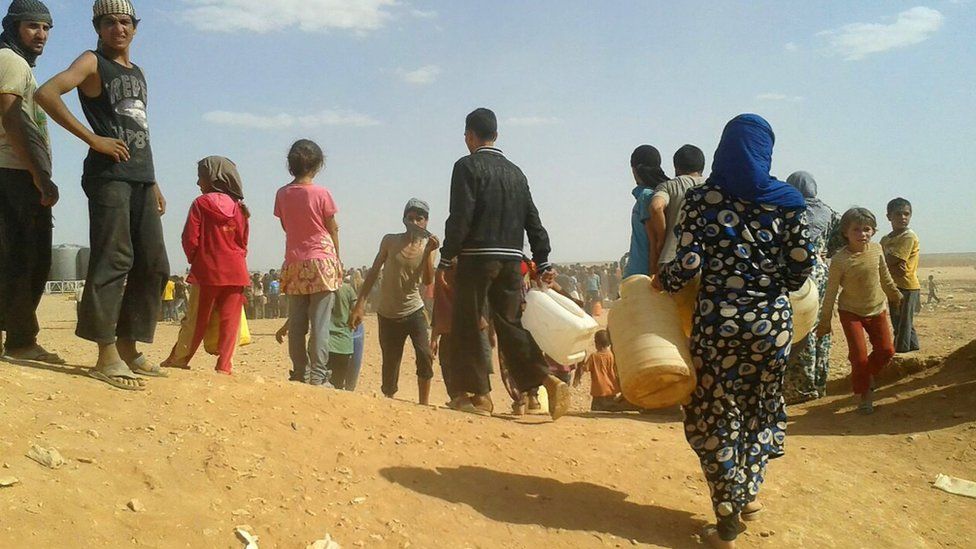Syria conflict: Fears for refugees stranded on Jordanian border
- Published

Aid groups have only twice been able to deliver water to the refugees since the 21 June attack
About 60,000 Syrian refugees stuck in the desert on the Jordanian border have received no aid for more than a week, Medecins Sans Frontieres (MSF) says.
The Jordanian authorities declared the border a closed military zone after a bomb attack near the informal camp at Rukban killed seven security personnel.
Since then, no food or medical assistance, and only extremely limited water, have reached the refugees.
MSF warned, external that the situation at Rukban was getting worse by the hour.
Conditions were already extremely harsh, with 214 of the 1,300 children under five years old screened by MSF teams malnourished and 24.7% of the children they saw suffering from diarrhoea, it said.
Before the attack, Jordan was allowing in only about 50 to 100 refugees from Rukban and another camp at Hadalat each day, citing security concerns.
'Massive failure'
"These people - more than 50% of whom are children - desperately need the immediate resumption of the provision of food, water and medical care. This cannot wait," said Benoit De Gryse, MSF's operations manager.
"But assistance alone is not enough. People fleeing war should be offered international protection and a safe place to relocate. Neither Syria nor the border are safe today," he added.
The refugees stranded at Rukban are dependent on aid, but a Jordanian government spokesman Mohammed Momani told the AFP news agency that the camp had become an "enclave" for the jihadist group Islamic State (IS) and that "national security must take precedence".
IS said one of its militants carried out the attack on 21 June, which saw a suicide bomber drive an explosives-laden lorry at the military post.
Many of the refugees at the camp are also believed to have fled areas of Syria controlled or previously controlled by IS. The group has come under pressure over the past year from Russian-backed forces loyal to President Bashar al-Assad and a Kurdish-dominated alliance supported by the US.
MSF said the Syrians were stranded at the border in extremely harsh conditions
On Thursday, a UN World Food Programme spokeswoman expressed concern for the refugees, saying they were "enduring very harsh weather conditions, sweltering heat and frequent dust storms" and had run out, or were running out, of food.
Since the attack, aid groups had only twice been able to deliver water to the camp, she told AFP.
The International Committee of the Red Cross said criminal gangs were taking advantage of the crisis to sell food and water at exorbitant prices.
UN satellite analysts mapped more than 6,400 probable shelters in Rukban in late April
Mr De Gryse described the situation at Rukban as a "massive failure of the international community".
"This is not just Jordan's responsibility. There are plenty of countries both in and outside of the region who should also step up to offer a safe place for refugees," he said.
Jordan is hosting 655,000 of the 4.84 million Syrians registered as refugees with the UN. Officials say more than one million other Syrians are living there, including those who arrived before the uprising against Mr Assad began in 2011.